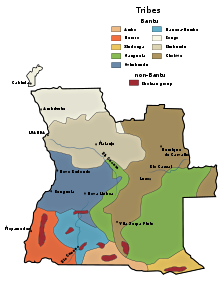Southern Mbundu people

Ethnical map of Angola
Ovimbundu area
|
|
| Total population | |
|---|---|
| (6 million) | |
| Regions with significant populations | |
| Angola | |
| Languages | |
| Umbundu, Portuguese | |
| Religion | |
| Christianity, African traditional religions | |
| Related ethnic groups | |
| Northern Mbundu people, Bantu peoples |
| Southern Mbundu | |
|---|---|
| Person | Ocimbundu |
| People | Ovimbundu |
| Language | Umbundu |
| Country | Ovimbunduland |
The Ovimbundu, also known as the Southern Mbundu, are a Bantu ethnic group who lives on the Bié Plateau of central Angola and in the coastal strip west of these highlands. As the largest ethnic group in Angola, they make up almost 40 percent of the country's population. Overwhelmingly the Ovimbundu follow Christianity, mainly the Igreja Evangélica Congregacional de Angola (IECA), founded by American missionaries, and the Catholic Church. However, some still retain beliefs and practices from African traditional religions.
The origins of the Ovimbundu are Bantu populations who drifted in from the North, over the last millennium, and formed local/regional groups which slowly became political units and foci of social identity: M'Balundu, Sele, Wambo, Bieno and others. They developed a sophisticated agriculture, completed by the breeding of small animals (chicken, goats, swine) as well as of a modicum of cows bought from the farmer-herders to the South (Nyaneka-Nkhumbi, Ovambo).
Incisive change came about when the Portuguese established a colonial bridgehead in Benguela, in the 16th century. Several of the small "kingdoms" saw their advantage in organising an intense caravan trade between Benguela and peoples of the East, in particular the Chokwe, the Luvale and the Mbunda, from whom they obtained wax, rubber, honey and ivory. Each trading caravan had a professional leader and diviner. Trade agreements that had linked the independent chiefdoms led to the development of regional specializations, including metalwork and cornmeal production. Slavery and the slave trade were also an integral part of Ovimbundu societies. Caravan trading declined with the suppression of the slave trade and, more importantly, the construction of the Benguela Railway in 1904, and came to an end shortly after 1910.
In the following years, the Ovimbundu completely changed their economy to cash crop production of corn, sold to a rapidly increasing network of Portuguese traders. However, because of their demographic growth, and because significant portions of their lands were appropriated by Europeans for coffee, sisal and other plantations, many Ovimbundu started to work as paid labour, mainly on European plantations in their own region or in Northwest Angola, but also in Namibian mines.
...
Wikipedia
